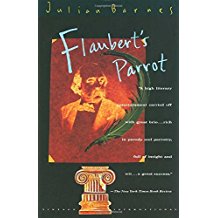Flaubert’s Parrot, Julian Barnes, 1984
One of my favorite authors uses a narrator who is obsessed with Flaubert to explore the meaninglessness of life, our imperfect memories of it, and the hopelessness of seeking understanding. The narrator, named only once halfway through the book, is a physician whose wife committed suicide recently. Exploring the area around Rouen where Flaubert lived he finds not one but two parrots referred to in a Flaubert novel and spends most of the book trying to figure out which one is the ‘real one’. Barnes plays with time, space, voice, and other modernist techniques to tell Flaubert’s story which changes with each adjustment made in these variables. Ultimately he decides that “People like us must have the religion of despair. By dint of saying, “That is so! That is so!” and of gazing down into the black pit at one’s feet, one remains calm.” “Books are where things are explained to you; life is where things aren’t. I’m not surprised some people prefer books. Books make sense of life. The only problem is that the lives they make sense of are other people’s lives, never your own.” Barnes prefers the ‘consolation of unfulfillment’, anticipating and then looking back on something, not experiencing the thing itself. A modernist, interesting, but not gripping novel.



